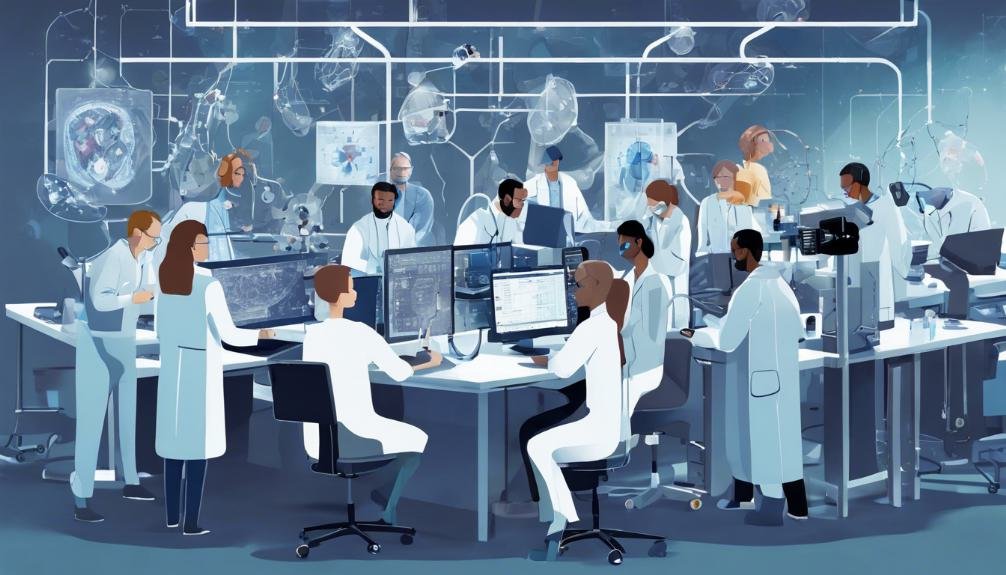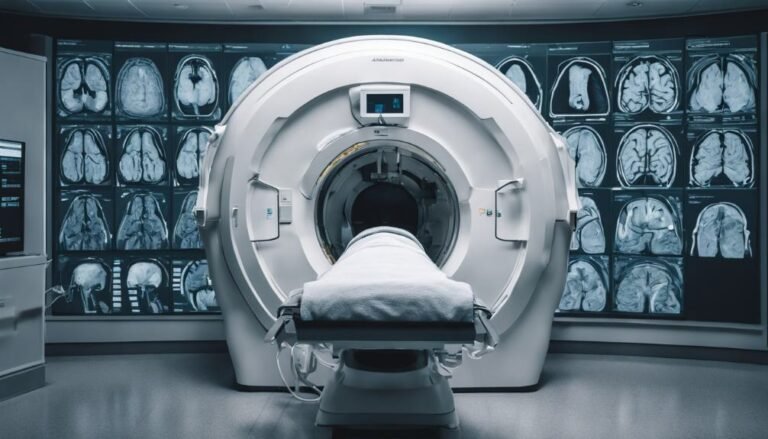AI in Rare Disease Research
Imagine a scenario where AI algorithms analyze genetic data from patients with a rare disease, identifying unique patterns that lead to more targeted treatment approaches. This level of precision in healthcare is just one of the many ways AI is revolutionizing rare disease research. As you explore the impact of artificial intelligence in this specialized field, you'll uncover how AI is reshaping diagnostics, drug discovery, and patient care, presenting a compelling case for its continued integration into rare disease research.
Key Takeaways
- AI enhances rare disease data analysis for accurate diagnoses.
- Machine learning detects subtle relationships in complex datasets.
- Personalized treatment plans are enabled by AI in rare disease management.
- AI expedites drug discovery for novel rare disease treatments.
- AI improves patient outcomes through personalized care and optimized treatment plans.
AI Applications in Rare Diseases
In rare disease research, AI applications have revolutionized the way data is analyzed and insights are gained to advance diagnosis and treatment strategies. Data analysis in rare diseases has been greatly enhanced through the use of machine learning algorithms. These algorithms can sift through vast amounts of patient data, genetic information, and clinical records to identify patterns and potential correlations that may have otherwise been missed by traditional methods.
Machine learning algorithms can detect subtle relationships within complex datasets, leading to more accurate diagnoses and personalized treatment plans for individuals with rare diseases.
Benefits of AI in Research
Utilizing artificial intelligence (AI) in research brings about a multitude of significant advantages, propelling advancements in various fields through its data-driven and efficient capabilities.
AI excels at data analysis by swiftly processing vast amounts of information, identifying patterns, and extracting valuable insights that may not be easily discernible through traditional methods. This capability enhances the speed and accuracy of research processes, enabling researchers to make informed decisions based on thorough data analysis.
Moreover, AI contributes to research optimization by streamlining tasks, automating repetitive processes, and reducing the likelihood of human error. By leveraging AI algorithms, researchers can optimize experimental design, predict outcomes, and prioritize areas for further investigation, ultimately saving time and resources in the research process.
The efficiency gained through AI-driven research optimization allows for a more focused and targeted approach, increasing the likelihood of uncovering novel findings and advancing scientific knowledge in a more streamlined manner.
Improving Diagnostics With AI
AI has revolutionized the field of diagnostics by enabling early detection and enhancing precision in diagnosing rare diseases.
Through sophisticated algorithms and machine learning capabilities, AI can analyze complex datasets to identify subtle patterns indicative of rare conditions that might be missed by traditional diagnostic methods.
AI for Early Detection
Enhancing diagnostic capabilities through the integration of artificial intelligence presents a promising opportunity to achieve early detection of rare diseases. AI algorithms can analyze vast amounts of patient data, including genetic information, biomarkers, and imaging results, to identify patterns indicative of rare diseases at early stages.
This early detection is essential as it allows for timely intervention and can profoundly impact disease progression. By detecting rare diseases early, healthcare providers can initiate treatments promptly, potentially improving treatment efficacy and patient outcomes.
Moreover, AI can assist in distinguishing subtle differences in disease manifestations that may be overlooked by traditional diagnostic methods. This precision in diagnosis enables healthcare professionals to tailor treatments more effectively to each patient's unique condition, optimizing therapeutic outcomes.
Additionally, AI algorithms can continuously learn and evolve, enhancing their diagnostic accuracy over time and potentially reducing misdiagnoses. Overall, the integration of AI in early detection holds great promise for improving rare disease management and enhancing patient care.
Precision in Diagnosis
Implementing advanced artificial intelligence technologies has revolutionized the precision and accuracy of rare disease diagnosis, greatly enhancing diagnostic capabilities for healthcare professionals.
AI has facilitated the identification of genetic biomarkers associated with various rare diseases, enabling earlier and more accurate diagnoses. By analyzing vast amounts of genetic data, machine learning algorithms can detect patterns and variations that may indicate the presence of a rare disease. These algorithms can sift through complex genetic information much more efficiently than traditional methods, leading to quicker and more precise diagnoses.
Furthermore, AI-driven diagnostic tools can continuously learn and improve their accuracy over time, adapting to new data and refining diagnostic capabilities. This adaptability enhances the ability to identify subtle genetic variations that may be indicative of rare diseases, ultimately aiding in earlier interventions and personalized treatment plans.
The integration of genetic biomarkers and machine learning algorithms in rare disease diagnosis showcases the transformative power of AI in improving precision and efficacy in healthcare practices.
AI-Powered Drug Discovery
Researchers leverage advanced algorithms to expedite the discovery of novel drug candidates for treating rare diseases. In drug development, machine learning plays a vital role by utilizing AI algorithms to sift through vast amounts of data and identify potential therapeutic compounds with higher efficiency and accuracy than traditional methods.
By analyzing complex biological interactions and predicting the efficacy of various compounds, these AI-powered systems streamline the drug discovery process.
Machine learning algorithms can analyze molecular structures, predict drug-target interactions, and even suggest modifications to enhance a compound's effectiveness. This technology accelerates the identification of promising drug candidates, saving time and resources in the search for treatments for rare diseases.
Additionally, AI algorithms can help researchers uncover new uses for existing drugs, repurposing them to address unmet medical needs in rare disease populations. As a result, AI-powered drug discovery is revolutionizing the field by offering innovative solutions to combat rare diseases more effectively.
Enhancing Patient Outcomes
AI in rare disease research plays a pivotal role in enhancing patient outcomes by greatly improving diagnosis accuracy.
Through the utilization of AI algorithms, healthcare providers can tailor personalized treatment plans based on individual patient data and disease characteristics.
This individualized approach not only enhances patient care but also leads to better treatment outcomes in the domain of rare diseases.
Improved Diagnosis Accuracy
Enhancing patient outcomes through the improved accuracy of rare disease diagnoses is a critical focus area in the application of AI technology within healthcare. Diagnostic precision plays a pivotal role in the early detection and management of rare diseases. Machine learning algorithms, particularly deep learning models, have shown significant promise in enhancing diagnostic accuracy by analyzing complex patterns in patient data.
By utilizing large datasets and recognizing subtle correlations that may escape human observation, AI systems can identify unique disease markers and improve accuracy in diagnosing rare conditions. These advancements reduce the likelihood of misdiagnoses and enable healthcare providers to offer tailored treatment plans promptly, consequently enhancing patient outcomes.
The integration of AI technology in rare disease diagnosis not only expedites the process but also guarantees a higher level of accuracy that traditional diagnostic methods may lack. As AI continues to evolve and learn from vast amounts of data, the potential to revolutionize rare disease diagnosis and positively impact patient care outcomes becomes increasingly evident.
Personalized Treatment Plans
Essentially, personalized treatment plans based on AI-driven insights have demonstrated significant potential in optimizing patient outcomes in rare disease management. Tailored care, reflective of an individual's unique genetic makeup, symptoms, and response to treatment, is paramount in enhancing the effectiveness of therapies for rare diseases.
By utilizing AI algorithms to analyze vast amounts of data, healthcare providers can identify patterns and predict how a patient may respond to specific treatments. This level of precision allows for treatment optimization, ensuring that patients receive therapies that are most likely to be effective for their condition while minimizing potential side effects.
Furthermore, AI can help healthcare professionals continuously monitor a patient's progress, adjusting treatment plans in real-time based on new data and insights. This proactive approach enables quicker adaptations to changes in a patient's condition, leading to better outcomes and improved quality of life for individuals with rare diseases.
Ultimately, personalized treatment plans driven by AI have the potential to revolutionize rare disease management by offering tailored, effective care that prioritizes the unique needs of each patient.
Challenges and Opportunities
Exploring the landscape of utilizing artificial intelligence in rare disease research presents a myriad of challenges and opportunities that require careful consideration and strategic planning. One major challenge is data integration, as rare diseases often have limited data available due to the small number of cases. Integrating diverse data sources, such as genetic information, clinical data, and imaging results, poses a significant hurdle that AI can help overcome by identifying patterns and extracting meaningful insights from complex datasets.
Moreover, funding challenges are a prevalent issue in rare disease research. Traditional funding models may not prioritize rare diseases due to their low prevalence, making it difficult to secure resources for AI-driven research projects. Collaborative efforts between governments, private organizations, and research institutions are essential to address this funding gap and support the development of AI solutions for rare diseases.
Ethical Considerations in AI
Exploring the intersection of artificial intelligence and rare disease research raises critical ethical considerations that demand careful evaluation and proactive decision-making. Two key ethical considerations in this domain are data privacy and bias prevention.
Data privacy is paramount when utilizing AI in rare disease research, as sensitive information about individuals' health conditions is involved. It's essential to guarantee that data is anonymized, encrypted, and securely stored to protect the privacy and confidentiality of patients. Additionally, measures must be in place to obtain proper consent for data usage and to adhere to regulations such as GDPR to safeguard patient information.
Bias prevention is another vital ethical consideration when employing AI in rare disease research. Biases in data collection, algorithm development, and decision-making processes can lead to inaccurate results and perpetuate disparities in healthcare. It's imperative to implement strategies to identify and mitigate biases, such as diverse dataset representation, transparent algorithm design, and regular bias audits.
Future Trends in Rare Diseases
As artificial intelligence continues to shape rare disease research, future trends in this field are positioned to revolutionize the understanding and management of these complex medical conditions.
Genetic therapies represent a cutting-edge approach that holds immense promise for treating rare diseases at their root cause – the genetic level. AI algorithms can sift through vast genomic data to identify potential targets for genetic therapies, ushering in a new era of personalized medicine tailored to individual patients' unique genetic makeup.
Data integration plays a pivotal role in the future of rare disease research by enabling the aggregation of diverse datasets from sources like electronic health records, genetic databases, and clinical trials. AI tools can then analyze this integrated data to uncover patterns, biomarkers, and potential treatment avenues that may have previously gone unnoticed.
Collaborations Driving Progress
In the domain of rare disease research, collaborations among researchers, clinicians, industry partners, and patient advocacy groups are essential drivers of progress and innovation. Data sharing plays a pivotal role in these collaborations, enabling the pooling of information from diverse sources to uncover patterns, identify potential treatments, and accelerate research outcomes. By sharing data, researchers can leverage larger datasets, leading to more robust analyses and discoveries that may not be possible with limited individual datasets.
International collaborations further enhance the impact of rare disease research efforts. By working with experts and organizations from around the world, researchers can access a broader range of knowledge, resources, and patient populations. This global approach fosters the exchange of ideas, methodologies, and best practices, ultimately advancing the understanding and treatment of rare diseases on a larger scale.
Through these collaborative efforts, the rare disease research community can collectively address challenges, share expertise, and drive meaningful progress in improving outcomes for individuals affected by these conditions.
Conclusion
To sum up, AI has transformed rare disease research like a skilled conductor orchestrating a symphony of data. By leveraging machine learning algorithms, AI has revolutionized diagnostics, drug discovery, and patient outcomes.
Despite challenges and ethical considerations, the future of rare disease research looks promising with collaborations driving progress. As technology continues to advance, the potential for AI to further optimize research processes and improve outcomes for individuals with rare diseases is vast.







